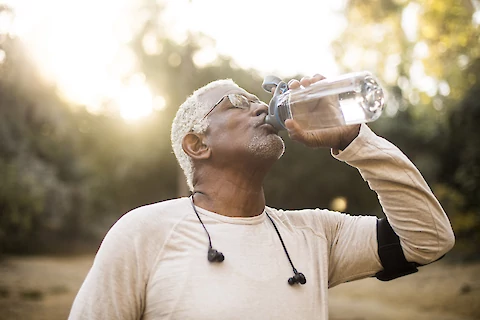
The Importance of Staying Hydrated During the Summer (Even in the Shade)
It's important for everyone to stay hydrated, but it's doubly important for seniors in South Bend because, as you get older, you might stop feeling as thirsty as before. However, this doesn't mean that your body doesn't need as much water as it used to.
According to this AARP article, men need about 15 cups of water a day while women need about 11. But this number could vary depending on your height and weight.
Seniors who are more active generally lose more water through perspiration, so they need to drink more to stay hydrated. Plus, you need to drink more water during the summer months to enable your body to stay cool.
How Can Seniors Stay Cool During the Summer Months?
If you don't stay cool during the summer months, you risk suffering from heat exhaustion and heat stroke. So here are a few tips seniors can follow to stay cool during the summer:
- Try to wear loose, breathable cotton or linen clothing. Darker colors and synthetic fabrics can make you feel hotter.
- Avoid alcohol and caffeine because these are diuretics i.e. they make you go to the bathroom more often. As a result, you end up losing more water.
- Try to stay out of the sun. This can mean being in the shade if you're outdoors. But on a really hot day, it might be best to stay indoors in a place that has air conditioning.
- If you need to run errands or go out for some reason, try to do it early in the morning or late in the evening when it's cooler.
- It's important to stay fit but exercising in the heat will have a detrimental effect on your health. Try to exercise in a place with air conditioning or do something low-key like yoga in which you won't end up sweating too much.
How Can Seniors Stay Hydrated During the Summer Months?
Staying cool is, of course, important, but no matter how hard you try to stay cool, you're not going to be able to do so without staying hydrated too. So here are some things to keep in mind:
- If you have a dry mouth, fatigue, dizziness, cramps, dark urine, a confused feeling, or extreme thirst, you might be dehydrated. Urinating less and being constipated are alsosigns of dehydration.
- Try and set up a hydration schedule. Drink a glass of water or some other fluid, such as fruit juice or skim milk, when you wake up, with every meal, and in-between meals as well.
- If you are a senior's caregiver, then make sure you keep prompting them to drink water and other fluids throughout the day rather than relying on them to tell you when they are thirsty.
- Many fruits and vegetables are also water-rich. Include cucumbers, lettuce, celery, bok choy, radishes, and other veggies in your diet. When it comes to fruits, go for watermelon, strawberries, grapefruit, cantaloupe, and peaches, among others.
- Keep a bottle of water (or flavored water) close to the senior. This way, they can reach for it easily throughout the day. Also make sure that the kitchen is stocked with water, fruit juice, milk, soy milk, etc.
Dehydration can be a serious problem for the elderly because their thirst response is no longer as strong as it used to be. However, if you take the above precautions, you can make sure that you or your senior stay hydrated and cool during the summer months. If you live in the areas of Mishawaka, Elkhart, and Goshe,contact us at Senior Helpers to learn more.